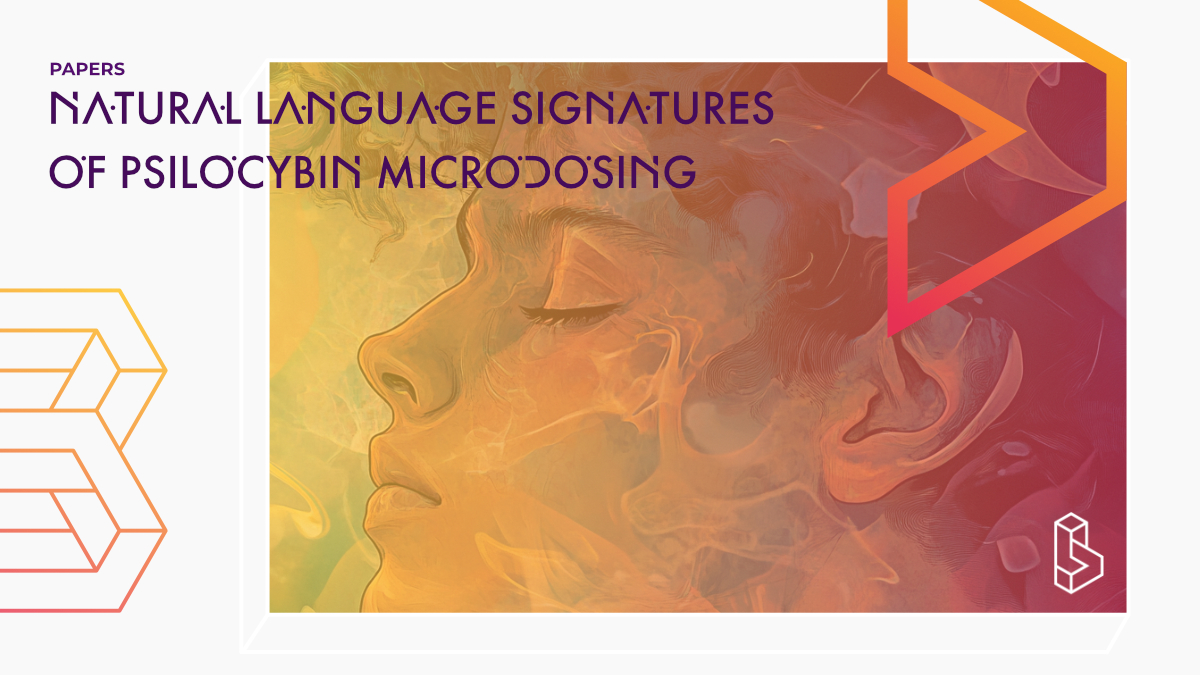This double-blind placebo-controlled trial (n=34) assessed natural language as a resource to identify speech produced under the acute effects of psilocybin microdoses (0.5g dried mushroom), focusing on variables known to be affected by higher doses: verbosity, semantic variability and sentiment score. Verbosity and sentiment scores significantly differed between groups suggesting that microdosing can be identified from natural speech.
Abstract of Natural language signatures of psilocybin microdosing
“Serotonergic psychedelics are being studied as novel treatments for mental health disorders and as facilitators of improved well-being, mental function and creativity. Recent studies have found mixed results concerning the effects of low doses of psychedelics (microdosing) on these domains. However, microdosing is generally investigated using instruments designed to assess larger doses of psychedelics, which might lack sensitivity and specificity for this purpose. Following a double-blind and placebo-controlled experimental design, we explored natural language as a resource to identify speech produced under the acute effects of psilocybin microdoses, focusing on variables known to be affected by higher doses: verbosity, semantic variability and sentiment scores. Except for semantic variability, these metrics presented significant differences between a typical active microdose of 0.5 g of psilocybin mushrooms and an inactive placebo condition. Moreover, machine learning classifiers trained using these metrics were capable of distinguishing between conditions with high accuracy (AUC close to 0.8). Our results constitute first proof that low doses of serotonergic psychedelics can be identified from unconstrained natural speech, with potential for widely applicable, affordable, and ecologically valid monitoring of microdosing schedules.”
Authors: Camila Sanz, Federico Cavanna, Stephanie Muller, Laura A. de la Fuente, Federico Zamberlan, Matias Palmucci, Lucie Janeckova, Martin Kuchar, Facundo Carrillo, Adolfo M. Garcia, Carla Pallavicini & Enzo Tagliazucchi
Summary of Natural language signatures of psilocybin microdosing
Psychedelic microdosing involves consuming small amounts of serotonergic compounds, approximating the perceptual threshold, two to four times per week. It is used for the self-treatment of mental health disorders such as depression or anxiety, and has been suggested as a model for the clinical use of psychedelics. Studies supporting the positive effects of microdosing are generally self-selected and lack adequate control conditions. Double-blind and placebo-controlled experimental designs have found less support for positive outcomes of microdosing.
Studies of full doses of psychedelic substances might not capture the subtler effects induced by microdosing, thus raising the need for novel methods to study low doses. The researchers adopted a non-invasive approach based on natural language processing to investigate the contents of the drug-elicited experience, and to investigate the modulation of language production itself, which can be informative of drug action beyond what is reported during the subjective acute effects. There are no works to date applying NLP to the study of microdosing. The researchers conducted a double-blind placebo-controlled experiment with 0.5 g dried material of Psilocybe cubensis mushrooms and obtained two metrics: verbosity and semantic variability. They also investigated the mean sentiment score to account for the purported effects microdosing on mood.
Methodology
Participants
Find this paper
Natural language signatures of psilocybin microdosing
https://doi.org/10.1007/s00213-022-06170-0
Open Access | Google Scholar | Backup | 🕊
Cite this paper (APA)
Sanz, C., Cavanna, F., Muller, S., De la Fuente, L., Zamberlan, F., Palmucci, M., ... & Tagliazucchi, E. (2022). Natural language signatures of psilocybin microdosing. Psychopharmacology, 239(9), 2841-2852.
Study details
Compounds studied
Psilocybin
Topics studied
Microdosing
Study characteristics
Original Re-analysis
Placebo-Controlled
Double-Blind
Randomized
Participants
34
Humans
Authors
Authors associated with this publication with profiles on Blossom
Enzo TagliazucchiEnzo Tagliazucchi is the head of the Consciousness, Culture and Complexity Group at the Buenos Aires University, a Professor of Neuroscience at the Favaloro University, and a Marie Curie fellow at the Brain and Spine Institute in Paris. His main interest is the study of human consciousness as embedded within society and culture.
Institutes
Institutes associated with this publication
University of Buenos AiresUBA is home to the Consciousness, Culture and Complexity & Phalaris Labs. Both labs are led by Enzo Tagliazucchi
Compound Details
The psychedelics given at which dose and how many times
Psilocybin 0.5 g | 1xLinked Research Papers
Notable research papers that build on or are influenced by this paper
Microdosing with psilocybin mushrooms: a double-blind placebo-controlled studyThis double-blind placebo-controlled study (n=34) explored the effects of microdosing psilocybin (0.5g of dried mushrooms) on subjective experience, behaviour, creativity, perception, cognition, and brain activity. In participants who correctly identified their experimental condition, the acute effects were more intense for the active dose compared to placebo. These effects were accompanied by reduced EEG in the theta band. However, no evidence supported enhanced well-being, creativity and cognitive function. Expectation likely underlies the positive effects of microdosing.
Microevidence for microdosing with psilocybin mushrooms: a double-blind placebo-controlled study of subjective effects, behavior, creativity, perception, cognition, and brain activity
This double-blind placebo-controlled preprint study (n=34) assessed the effects of microdosing psilocybin (0.5g dried mushrooms, about 0.9mg psilocybin) on subjective experience, behaviour, creativity, perception, cognition, and brain activity. Participants received two doses (psilocybin/placebo) administered separately, one week apart. Subjective effects were more intense for the active dose, while null effects or a trend towards cognitive impairment were observed. Expectation effects may be, in part, responsible for the anecdotal benefits of microdosing.

